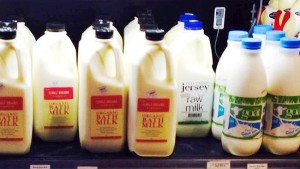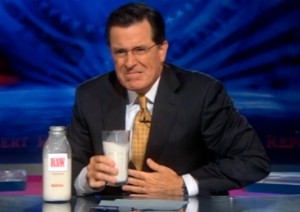A national ban on the sale of raw milk is looming after state and territory leaders agreed consumers need protection from the dangers posed by unpasteurized milk.
 The Australia and New Zealand Ministerial Forum on Food Regulation, attended by ministers responsible for food regulation, raised their ‘extreme concern’ about the consumption of unpasteurized cow’s milk that is sold as ‘bath milk’ with a disclaimer ‘not for human consumption’.
The Australia and New Zealand Ministerial Forum on Food Regulation, attended by ministers responsible for food regulation, raised their ‘extreme concern’ about the consumption of unpasteurized cow’s milk that is sold as ‘bath milk’ with a disclaimer ‘not for human consumption’.
The forum found urgent action was required at a national level and are asking for “a joint public health, food safety and consumer law solution that will deliver a consistent approach across all Australian jurisdictions”.
Last month Premier Mike Baird vowed to work with other state and territory leaders to stop health food stores selling the potentially deadly product.
His move followed Victoria’s tough action on producers of raw milk following the death of a Victorian child and the hospitalization of four other children in December. The children suffered severe complications as a result of food poisoning sourced to raw milk consumption.
The sale of raw milk is already banned for human consumption in all states and territories but raw milk is sold as ‘bath milk’ or ‘cosmetic milk’ with a disclaimer, but it is knowingly being consumed by people who argue the bacteria in raw milk are beneficial to health.
Microbiologist Professor Michael Eyles, chair of the Food Safety Information Council, said raw milk was a dangerous product because it contained dangerous bacteria which had the opportunity to multiply during packaging, transit and storage for retail.
 “It’s just irresponsible to sell raw milk and pretend it’s safe, it is not,” Prof Eyles said.
“It’s just irresponsible to sell raw milk and pretend it’s safe, it is not,” Prof Eyles said.
Victorians who give family members raw milk to drink face fines of $60,000 under new regulations.
As of Sunday, a strong bittering agent will be put into unpasteurized milk to deter people from consuming it, according to the state’s minister for consumer affairs, Jane Garrett.
More than 100 protesters gathering outside Garrett’s Brunswick office and vowing they would continue drinking milk in what they describe as its “purest form.”
Meanwhile, specialist cheese makers are welcoming a decision by the New Zealand and Australian health ministers to allow a wider range of cheeses to be made from raw milk.
The decision was made at a meeting of the ministers in Auckland. The new rules require that the raw milk cheese does not support the growth of disease-causing bacteria, and that there is no rise in the level of those during processing.
